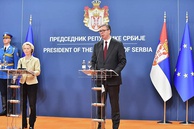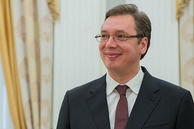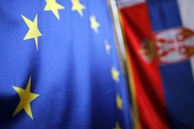In the Balkans, still aching from the numerous "unhealed wounds" left by the breakup of Yugoslavia, the fragile peace is being threatened again. This time, it is Republika Srpska (an entity within Bosnia and Herzegovina) which finds itself under attack from a Western coalition.
As Milorad Dodik, President of Republika Srpska, noted when speaking on the sidelines of the Valdai Discussion Club at the Krasnaya Polyana complex in Sochi, “Western countries, led by the United States and their European partners, have, from the very first day of the Republic's establishment, sought to create a kind of imaginary Bosnia and Herzegovina, with no regard for the interests of the Serbs, which is a priori impossible. It is precisely why Western countries insist on the need to complete the 'unfinished business in the Balkans' in 2025."
He added that Republika Srpska is “without a doubt, an impediment to the global interests of the collective West, and this has been going on for many years, or rather, decades. The West is constantly trying to violate the Dayton Agreement, which is the basis of the fragile peace in the Balkans." 1
The October 2 meeting between Vladimir Putin and Milorad Dodik on the fringes of the Valdai Forum demonstrated a similarity of the two countries’ positions on how best to resolve key international issues. When congratulating Milorad Dodik on the recent "Day of Serb Unity," which the people of the Republic celebrated on September 15, President Putin emphasized that the region, which Republika Srpska is part of, finds itself in a very difficult situation. Both presidents noted the importance of coordinated actions to normalize the political situation in the Balkans, above all in Serbia and Republika Srpska, chosen by the West, led by the United States, as targets for destabilization, with the violation of the Dayton Agreement being a key factor.
Here it is worth recalling that "The General Framework Agreement for Peace in Bosnia and Herzegovina" on a ceasefire, the separation of warring parties, and the demarcation of territories, which ended the civil war in that republic, was agreed upon on November 21, 1995, at Wright-Patterson US Air Force Base in Dayton, Ohio, and signed on December 14, 1995, in Paris by the then-presidents of Bosnia and Herzegovina, Alija Izetbegovic; Serbia, Slobodan Milosevic; and Croatia, Franjo Tudjman. The US, Russia, Germany, Britain and France – the guarantor countries of the peace settlement – all took part in the Dayton negotiations.
The signed accord stipulated that the state of Bosnia and Herzegovina should consist of two territorial entities—the Federation of Bosnia and Herzegovina and Republika Srpska. As a result, Serbs received 49 percent of the territory, while Bosniaks and Croats received 51 percent.
The Dayton Agreement not only laid the foundation for the constitutional structure of Bosnia and Herzegovina, which remains in place to this day, but also, and far more importantly, ended the fratricidal war and brought peace, albeit fragile, to the Balkans.
However, in recent years, Western countries, led by the US and its European partners, have been actively calling for a revision of the Dayton Agreement and the introduction of a unified Constitution of Bosnia and Herzegovina, which would certainly allow Bosniaks and Croats to speed up their country’s entry into the European Union and NATO effectively disregarding the interests of the Serbs. The people of Republika Srpska responded to this by ignoring Western calls and taking steps to separate from Bosnia and Herzegovina, thus further asserting their sovereignty. As a first step in this direction, the Republic's leadership decided in June 2023 to withdraw from the jurisdiction of the Constitutional Court of Bosnia and Herzegovina. Notably, in keeping with the Dayton accords, legislative power in the country belongs to the National Assembly, which consists of the House of Peoples and the House of Representatives, where two-thirds of MPs are elected from the Federation of Bosnia and Herzegovina, and only one-third from Republika Srpska.
In order to facilitate efforts undertaken, as well as to mobilize and coordinate the further activities of organizations and institutions involved in the implementation of the peace settlement, by resolving tasks assigned within the framework of a United Nations Security Council resolution, the Parties working on the provisions of the Dayton Agreement requested the appointment of a High Representative, which was done in accordance with UN Security Council Resolution No. 1031 of December 15, 1995 (code — S/RES/1031).
Pursuant to this Resolution and guided by Article 1, Paragraph 2 of Annex 10 of the Dayton Agreement, the position of High Representative for Bosnia and Herzegovina was introduced, whose powers were defined in 1997-1998 at the Bonn-Petersberg and Madrid meetings by the Peace Implementation Council (PIC), granting the High Representative the following rights: to determine the place and time of joint meetings of Bosnia and Herzegovina authorities, as well as the procedure for presiding over them; in cases where the parties in Bosnia and Herzegovina fail to reach an agreement, to issue interim decisions binding on all authorities; to remove any official from office, both in Bosnia and Herzegovina and in its constituent entities; and to prohibit any person from participating in elections and holding any "elected or appointed public office, as well as positions in political parties."
Until 2021, the appointment of High Representative for Bosnia and Herzegovina was approved by the UN Security Council upon the recommendation of the Steering Board of the Peace Implementation Council (Dayton Agreement), whose members currently include 55 countries, including the US, Russia, the European Union, Britain, Germany, France, Italy, Canada, Japan, China, and the Organization of Islamic Cooperation, represented by Turkey. Due to the fact that Christian Schmidt, former State Secretary of the German Defense Ministry, has carried out the duties of High Representative for Bosnia and Herzegovina since 2021 without approval by the UN Security Council, Russia, China, Serbia, and Republika Srpska consider him illegitimate.
As stated by Russian Foreign Ministry spokesperson Maria Zakharova on December 15, 2021, Russia does not recognize Schmidt as the High Representative for Bosnia and Herzegovina. "German citizen Christian Schmidt cannot be considered the High Representative for Bosnia and Herzegovina, as the UN Security Council did not adopt a resolution approving him for this post, since the corresponding Russian-Chinese draft was blocked. Furthermore, statements 'about Schmidt's appointment' by ambassadors accredited in Sarajevo from member countries of the Steering Board of the Peace Implementation Council (Dayton Agreement) for Bosnia and Herzegovina are insufficient," she noted.
Zakharova added that "under these circumstances, Bosnian Serbs, as one of the three equal constituent peoples of Bosnia and Herzegovina, are fully entitled to refuse to recognize Schmidt as a legitimate representative of the international community." She also criticized statements about the supposedly optional nature of the UN Security Council's participation in this matter and Annex 10 of the Dayton Agreement, as a quarter-century practice of appointing High Representatives suggests otherwise. According to Maria Zakharova, in the absence of expressed international support and, crucially, consensus within Bosnia and Herzegovina itself, Schmidt lacks the legitimacy required to perform the functions of High Representative. She further noted that Russia was forced to suspend its participation in the meetings of the Steering Board of the Peace Implementation Council (Dayton Agreement) chaired by the "self-proclaimed High Representative." 2
However, contrary to all legal conditions and international agreements, this did not prevent the imposter Schmidt from initiating a judicial process against Milorad Dodik, which took place in Sarajevo on February 5, 2025. Bosnia and Herzegovina’s Prosecutor's Office accused the President of Republika Srpska of so-called non-compliance with the decisions of the High Representative, and on February 26, 2025, the court upheld the verdict. On August 1, 2025, the Appellate Chamber of the Bosnia and Herzegovina Court rejected the defense's appeal and affirmed the verdict against Dodik issued on February 26, 2025, which had sentenced him to one year behind bars. He was also banned from engaging in political activities and holding public office for six years.
On May 27, 2025, the ambassadors of the countries on the Steering Board of the Peace Implementation Council (Dayton Agreement) for Bosnia and Herzegovina unilaterally extended Christian Schmidt's mandate as High Representative for Bosnia and Herzegovina. Russia, which is a member of the committee, opposed this decision. Currently, the Russian Federation and the leadership of Republika Srpska do not recognize the legitimacy of Schmidt, the West's appointee, and are also withdrawing their consent to a common army of Bosnia and Herzegovina and a common judicial and prosecutorial council.
Meanwhile, implementing the tasks assigned him Schmidt went even further initiating a decision by the BiH Central Election Commission to terminate the mandate of Republika Srpska President Milorad Dodik. On August 6, 2025, the Commission decided to hold early elections in the Republic on November 23, 2025, and to revoke President Dodik's mandate. In response to the CEC's decision, the President of Republika Srpska stated that he and members of his ruling party, the Alliance of Independent Social Democrats, would not participate in these elections, calling the mayhem created by Schmidt a "political attack on the Republic" and emphasizing that he does not recognize the court's decision.
The reaction of the deputies of the National Assembly of Republika Srpska was predictable. The deputies voted in favor of a nationwide referendum to be held on October 25, 2025, intended to reject a court ban on Milorad Dodik holding the entity’s presidency. The referendum question reads: "Do you accept the decisions of the unelected foreigner Christian Schmidt and the rulings of the unconstitutional Court of Bosnia and Herzegovina issued against the President of Republika Srpska, as well as the decision of the Central Election Commission to strip the President of Republika Srpska, Milorad Dodik, of his mandate?”
Vladan Petrov, a professor at the University of Belgrade Law Faculty and a judge of the Constitutional Court of Serbia, reminded that the Central Election Commission of Bosnia and Herzegovina does not have the authority to strip the sitting President of the Republic, Milorad Dodik, of his mandate. He pointed out that, according to the Constitution of Republika Srpska, the president's mandate can only be terminated prematurely in the event of resignation or recall by the people.
Russia's position on the situation in Republika Srpska was outlined by Foreign Minister Sergey Lavrov, who responded to the criminal prosecution of Milorad Dodik by stating that "Russia strongly condemns attempts to use made-up criminal cases to remove from power Serbian leaders who are undesirable to the West, in particular, our friend and the lawfully elected, legitimate President of Republika Srpska, Milorad Dodik." According to Lavrov, the sole purpose of persecuting the President of Republika Srpska is to eliminate from the political scene an undesirable leader, who consistently opposes Western neocolonialism. He expressed Russia’s disappointment with the unjust and anti-democratic decision in the fabricated criminal case and strongly supports the legitimate authorities of Republika Srpska. To this, he added that as a permanent member of the UN Security Council and a guarantor of Dayton peace accords, Russia will use all political means at its disposal to prevent the West-provoked escalation of tensions in Republika Srpska. 3
Meanwhile, President Milorad Dodik is convinced that Europeans are preparing NATO for a major war to retain power. He believes that preparation for a major war is needed by a number of European politicians to distract from social problems at home and cling to power, and that the situation within the European establishment is teetering on the brink of madness. The fact is that the current Brussels establishment and the leading Western European countries have destroyed the social and societal fabric of both Europe as a whole and their own countries. For many reasons, they have obliterated all the advantages that Europe once possessed. Therefore, it is quite logical that they view everything through the prism of militarization and the spreading of fear, both within their own countries and beyond. 4
Serbian President Aleksandar Vucic cautiously supported his colleague, stating that President Milorad Dodik is not the source of the political crisis in Bosnia and Herzegovina, but is merely reacting to the existing circumstances. He described the decision by the Central Election Commission of Bosnia and Herzegovina to annul President Dodik's mandate as a mistake that puts in question the will of the voters. According to the Serbian president, Belgrade will continue to support the people and institutions of Republika Srpska and simultaneously "strive to preserve peace and prevent further escalation on the peninsula."
Conclusions
Firstly, all actions taken against the popularly elected President of Republika Srpska, Milorad Dodik, by the illegitimate High Representative for Bosnia and Herzegovina, Christian Schmidt, constitute a gross violation of international law, as he has not been endowed with the powers of the UN Security Council.
Secondly, active attempts by the so-called collective West to destabilize the situation in Republika Srpska by using "Maidan-style coup" techniques and removing political leaders undesirable to the West, are nothing more than a desire to replace the current legitimately elected representatives of the people with more pliable leaders loyal to the West.
Thirdly, according to the plan devised by the European political elite, a change of power in Republika Srpska and Serbia should lead to the incorporation of the Serb republics into pro-Western alliances, including the European Union and NATO.
Fourthly, the destabilization of the political situation in Republika Srpska and Serbia, with the direct involvement of Western countries, are interconnected processes aimed at creating a tense political situation in these two Balkan republics, kindred to Russia, with an eye to destroying the fragile peace in the Balkans and detaching them from the Russian world.
In conclusion, I will take the liberty of quoting the last words of Serbia's first president, Slobodan Milosevic, spoken during the Hague Tribunal: "Russians! I appeal to all Russians: residents of Russia, Ukraine, and Belarus, and those living in the Balkans – I consider them Russians too. Look at us and remember – they will do the same to you if you show weakness. The West will seize you by the throat. Brothers, remember the fate of Yugoslavia!"
---------------------------------------------------------------------
1 Dodik: The West has been trying to violate the Dayton Accords since day one, October 5, 2025. https://tass.ru/mezhdunarodnaya-panorama/25256009
2 Zakharova: Russia will not recognize Schmidt as High Representative for Bosnia and Herzegovina without UN Security Council approval, December 15, 2021. https://tass.ru/politika/13205371
3 Lavrov condemned Western attempts to remove Dodik from power, September 9, 2025. https://ria.ru/20250909/rossija-2040692938.html
4 Dodik: Europeans are preparing for a major war to retain power, October 5, 2025. https://tass.ru/mezhdunarodnaya-panorama/25255539
read more in our Telegram-channel https://t.me/The_International_Affairs

 17:48 08.10.2025 •
17:48 08.10.2025 •



























